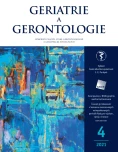Ethical dilemmas in infaustic prognoses: an empiric study
Authors:
Jaromír Škoda 1,2; Kateřina Ivanová 1
Authors‘ workplace:
Ústav veřejného zdravotnictví LF UP, Olomouc
1; Ústav lékařské etiky a humanitních základů medicíny 2. LF UK, Praha
2
Published in:
Geriatrie a Gerontologie 2021, 10, č. 4: 210-215
Category:
Original Article
Overview
The essay deals with the dilemmas of terminally ill patients aged 60 years or older. The sampling consists of 507 case studies and was assessed according to the interpretative phenomenological analysis (IPA). Our assumption for the evaluation results from a combination of the bioethical principialism and the Four Boxes method. In terms of IPA, we do not assess the cases in a way that would unnecessarily contaminate the experiences of the practitioners. Practitioner vs. his surroundings was the interaction which was taken as the criterion for classification. We group the case studies based on who, according to the author (the practitioner), is an accomplice in the ethical conflict. We specify the types of the ethical conflicts of individual groupings in the following manner: practitioner vs. institution, practitioner vs. patient, practitioner vs. family, practitioner vs. practitioner. These clusters are satiated by 9 types of situations – we introduce them through by providing examples and statements. In summary, based on the experiences of practitioners, we could claim that certain ethical dilemmas, which can be assumed intuitively in the case of the terminally ill, are evident: dilemmas concerning treatment and conflicts with the patient, with his family, and, in exceptional cases, with another practitioner. We regard conflicts related to disputes between the practitioner and the institution as of utmost importance. This grouping is predominantly concerned with the following question: When does palliative care turn into keeping the patient forcefully alive regardless of the patient’s increasing suffering.
Keywords:
Bioethics – ethical dilemma – infaust – terminal – experience of physicians – persons 60+
Sources
1. Ivanová K. Multikulturní ošetřovatelství I. Praha: Grada 2005.
2. Callahan JC. Ethical Issues in Professional Life. New York: Oxford University Press 1988.
3. Beauchamp TL, Childress JF. Principles of Biomedical Ethics. New York: Oxford University Press 2012.
4. Ivanová K. Základy etiky a organizační kultury v managementu zdravotnictví. Brno: Národní centrum ošetřovatelství a nelékařských zdravotnických oborů 2006.
5. Jonsen A, Toulmin S. The Abuse of Casuistry: A History of Moral Reasoning. Berkeley: University of California Press 1988
6. Jonsen A. Casuistry: An Alternative or Complement to Principles? Kennedy Inst Ethics J 1995; 5(3): 237–251.
7. Hanák PB, Ivanová K. Kazuistika pod zorným úhlem hippokratovské medicíny. Perdiatr Praxi 2018; 19(2): 113–115.
8. Škoda J. Etické konflikty – zakončení dráhy při infaustní prognóze. In: Tučková D, Ivanová K, Nemoc jako lékařská diagnóza a/nebo součást životní dráhy. Olomouc: Univerzita Palackého v Olomouci 2021 : 42–43.
9. Jonsen AR, Siegler M, Winslade WJ. Clinical Ethics: A practical Approach to Ethical Decisions in Clinical Medicine. New York: McGraw-Hills 2015.
10. Prignel J, Drummond J, McLafferty E, et al. Interpretative Phenomenological Analysis: A Dischussion and Critique. Nurse Res 2011; 18(3): 20–24.
11. Smith JA, Osborn M. Interpretative Phenomenological Analysis. In: Smith JA. Qualitative Psychology: A Practical Guide to Research Methods. London: Sage 2003 : 53–80.
12. Šimek J. Lékařská etika. Praha: Grada Publishing 2015.
13. Thai JN, Walter LC, Eng C, et al. „Every Patient is an Individual“: Clinicians Balance Individual. J Am Geriatr Soc 2013; 61(2): 264–269.
14. de Boer AF, de Voogd X, Meeshoek A, et al. Dignity-conserving Palliative Care in a Diverse Population: A Qualitative Study of Physician‘s Perspective. Palliat Support Care 2021 : 1–7.
Labels
Geriatrics General practitioner for adults Orthopaedic prostheticsArticle was published in
Geriatrics and Gerontology

2021 Issue 4
- Advances in the Treatment of Myasthenia Gravis on the Horizon
- Hope Awakens with Early Diagnosis of Parkinson's Disease Based on Skin Odor
- Memantine in Dementia Therapy – Current Findings and Possible Future Applications
- Memantine Eases Daily Life for Patients and Caregivers
-
All articles in this issue
- Editorial
- Health literacy in the elderly: Awareness and misinformation in relation to the diagnosis of type 2 diabetes mellitus
- Measurement of perioperative neurocognitive disorder in seniors above 65 years old – pilot study
- Transforming the life path of „floating seniors“
- Subjective assessment in relation to selected aspects in the population over 60 years old
- Ethical dilemmas in infaustic prognoses: an empiric study
- Behavioral and personality disorders in old age
- Spiritual care for the elderly in a hospital setting: a path to forgiveness and reconciliation
- Cause of acute onset dysphagia in a geriatric female patient
- Vascular occlusions in COVID-19: a case series
- American Geriatrics Society Position Statement on Achieving Gender Equity in Geriatrics
- On the 30th anniversary of the 3rd Department of Internal Medicine – Metabolic Care and Gerontology in Hradec Králové
- Geriatrics and Gerontology
- Journal archive
- Current issue
- About the journal
Most read in this issue
- Behavioral and personality disorders in old age
- Cause of acute onset dysphagia in a geriatric female patient
- Ethical dilemmas in infaustic prognoses: an empiric study
- Health literacy in the elderly: Awareness and misinformation in relation to the diagnosis of type 2 diabetes mellitus
